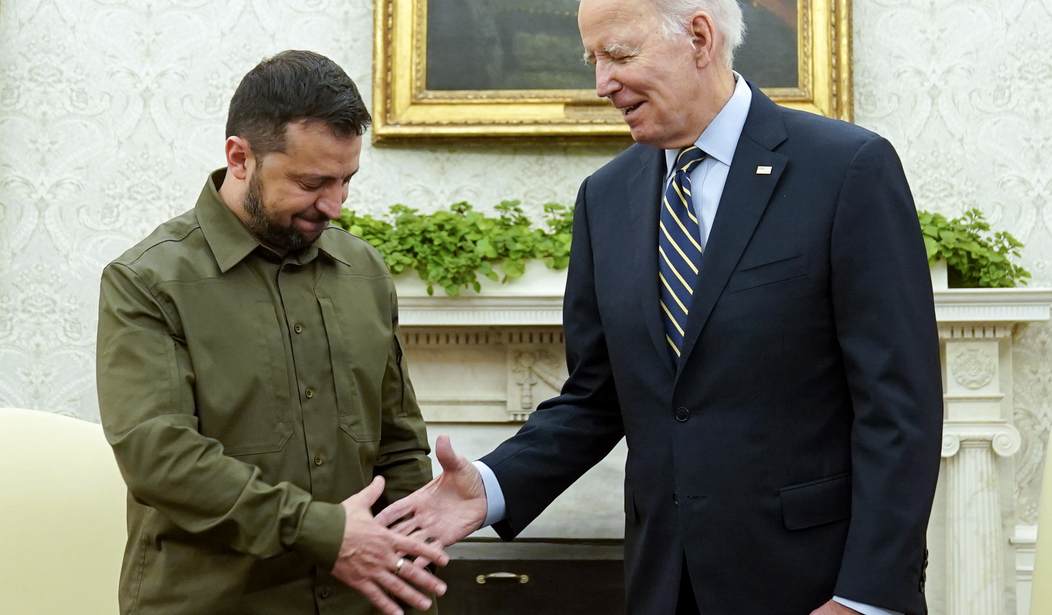The Ukraine narrative from the White House goes something like this. Ukraine is a corrupt country but is improving in its anti-graft efforts. And Republicans who use corruption as an excuse not to unquestioningly support Ukraine in its war against Russia are being disingenuous.
The Atlantic’s Tom Nichols summarizes this position, writing, “Republicans are trying to cloak their opposition to military and humanitarian assistance to Ukraine in a lot of codswallop about oversight and budget discipline.”
When the nation that ranks as the second most corrupt country in Europe next to Russia receives $75 billion in U.S. tax dollars, it’s hardly “codswallop” to demand transparency and an accurate accounting of where the hell all that money is going.
But this is the tack that the White House decided from the beginning to follow. Opposition to the war in Ukraine means you support Putin. Opposition to funding the war hides your true motives — supporting Russia and Putin.
I’m not saying there aren’t some misguided Republicans who think Putin is the bee’s knees and have swallowed the Russian propaganda that the Ukrainian government is run by a bunch of World War II Nazis who dress in jackboots and do the goose step behind closed doors.
And it’s not a question of “opposing” Ukraine funding. Most of us support the war effort to stop Russian aggression but don’t like the idea that up to a quarter of that $75 billion that we’ve sent to Ukraine may be disappearing into the pockets of oligarchs and war profiteers. Is it really too much to ask that the Biden administration give Congress details about how much is being stolen and what’s being done to stop it?
Apparently, yes. A “sensitive but unclassified” document originally published on the State Department’s website in abbreviated form gives a harsh assessment of corruption in Ukraine and the failing efforts to deal with it.
Ukrainian graft has long been a concern of U.S. officials all the way up to President Joe Biden. But the topic was deemphasized in the wake of Russia’s February 2022 full-scale invasion, which Biden has called a real-life battle of democracy against autocracy.
For months, Biden aides stuck to brief mentions of corruption. They wanted to show solidarity with Kyiv and avoid giving fuel to a small number of Republican lawmakers critical of U.S. military and economic aid for Ukraine.
More than a year into the full-scale war, U.S. officials are pressing the matter more in public and private. National security adviser Jake Sullivan, for instance, met in early September with a delegation from Ukrainian anti-corruption institutions.
Also for our VIPs: How Much U.S. Military and Economic Aid to Ukraine Has Been Stolen?
There have been a few high-profile arrests and dismissals. Most recently, Ukraine President Volodymyr Zelenskyy “fired all regional military recruitment bosses amid reports of corruption, replacing them with soldiers who have been on the front lines or who have been hurt in combat,” according to a report in Politico.
The recruiting officers were getting wealthy selling transfers to quiet sectors and medical deferments, and they found one recruiting chief drafting new recruits to build a vacation house. But this was a drop in the bucket. The real corruption is in the sales of arms to third parties.
“Loose weapons” in Ukraine indicate that someone is selling U.S. weapons to people who have no business getting them. What Congress is interested in finding out is where American weapons are going.
All of this was already a problem before the conflict. The invasion exacerbated these issues as the country was flooded with a sudden influx of millions of arms and ammunition and an increasing number of civilians received military training and weapons. As Rep. Sara Jacobs (D‑CA) noted at a 2022 Cato policy forum on the risk of weapons trafficking in Ukraine, the United States does not “have the capacity to do the end‐use monitoring we were doing before” because monitoring changes when you begin to “arm an insurgency.”
About one in four Ukraine citizens paid a bribe to a government official of some kind in the last year. With that kind of graft embedded so deeply in Ukraine’s culture, it will be next to impossible to root it out.










